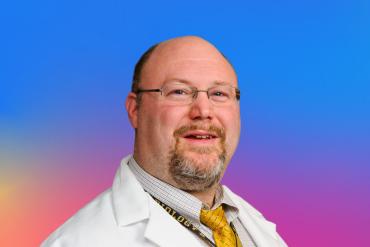Meet Dr. David Beversdorf
Dr. David Beversdorf
Professor of Radiology, Neurology, and Psychological Sciences, William and Nancy Thompson Endowed Chair in Radiology, University of Missouri and the Thompson Center
We hope to bring about a new treatment approach that actually helps a core aspect of ASD, social interaction, and perhaps also impacts anxiety
As a neurologist, Dr. David Beversdorf always has the brain on his mind. His interest in understanding how we think led him to explore how thinking in autism is different. Now his work focuses on how the brain impacts social skills in autistic people, and ultimately, how to help.
In central Missouri where Beversdorf works at the University of Missouri’s Thompson Center for Autism and Neurodevelopmental Disorders, people with autism and their families experience similar challenges as elsewhere in the U.S., such as a shortage of providers to diagnose autism and access to quality care. But in rural areas throughout the state, access to autism services is extremely limited. He is one of the only providers in the state providing autism diagnosis services for adults.
“There is a tremendous need for help, and I would like to try to provide some,” Beversdorf said.
Beversdorf’s Cognitive Neuroscience Lab is working to address one of the core challenges in autism – social communication. His team is running a double-blind placebo-controlled trial of a well-known blood pressure medication, which is also commonly used for performance anxiety. They hope to show that, in certain groups of patients, the medication might improve social communication and language. They are also looking at brain imaging markers to see if they help identify who will respond best to this type of treatment.
In a separate study funded through our partners, the Autism Intervention Research Network on physical Health and conducted through the Autism Speaks Autism Treatment Network, Beversdorf and his colleagues also looked at how stress reactivity and related anxiety are related to gastrointestinal symptoms like constipation in people with autism.
“We hope to bring about a new treatment approach that actually helps a core aspect of ASD, social interaction, and perhaps also impacts anxiety,” Beversdorf said. He is also collaborating with other colleagues looking at effects on gastrointestinal symptoms.
He is part of an ATN trial of minocycline, an antibiotic commonly used to treat acne, looking to understand if it helps enhance social communication for certain groups of people with autism.
And that’s not all the heavy lifting shouldered by this competitive weight-lifter. In addition to caring for adults with autism at the Thompson Center, his other research projects include exploring how other brain chemicals work in autism and prenatal factors that may increase risk for autism.
“This research is the tip of the iceberg for us,” Beversdorf said.









